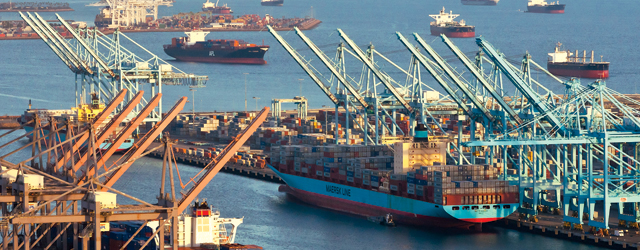West Coast Ports’ Partial Shutdown Stokes Fear of Prolonged Closures
 Tim Rue/Bloomberg News
Tim Rue/Bloomberg NewsThis story appears in the Feb. 16 print edition of Transport Topics.
CORAL GABLES, Fla. — Port operators ratcheted up the pressure to resolve West Coast contract talks by shutting down vessel operations over the Presidents Day weekend, escalating fears of a shutdown.
The Pacific Maritime Association announced the shutdown for
Feb. 12, as well as Feb. 14-16, saying terminal operators did not want to pay a 50% wage premium for workers who were slowing shipments. Negotiations slowed as well, with only one day of talks last week.
“PMA members have concluded that they will not conduct vessel operations on those dates, paying full shifts of ILWU workers
such high rates for severely diminished productivity,” management spokesman Wade Gates said, citing a 50% pay holiday premium that rewards some workers with $92 hourly pay.
“The employers are trying to sabotage negotiations,” International Longshore and Warehouse Union President Robert McEllrath
retorted. “What our employers are doing is bad for the industry and the U.S. economy.”
Several dozen ships remained at anchor waiting to unload late last week, including 22 at the ports of Los Angeles and Long Beach, California. PMA said individual terminal operators may continue gate and yard operations at their discretion.
The quiet on the docks contrasted with the mounting chorus from shippers, carriers and politicians pressing for a settlement. The pressure intensified as meat exports threatened to rot and consumer goods of all kinds, including beads for upcoming Mardi Gras celebrations, did not arrive to their destinations.
The sides have been negotiating for nine months to replace a contract covering 29 ports and 20,000 dockworkers that expired July 1. The union has said a settlement “is extremely close” after management offered a 3% wage and 11% pension increase with no givebacks.
Freight industry officials meeting at a conference here hosted by BB&T Capital Markets expressed exasperation.
“If four days becomes four weeks, it’s Katy bar the door,” with steep rate increases ahead, said Rick Schart, vice president of supply chain at discount retailer Stein Mart Inc.
“There is going to have to be a strike or lockout,” said Garry Old, CEO of equipment provider COFC Logistics, who believes it could take six months to unscramble the mess.
Thomas Shurstad, vice chairman of refrigerated intermodal operator Tiger Cool Express said, “this will end up like 2002,” when President George W. Bush had to invoke federal law to end a 10-day lockout.
Shurstad said port trucking rates have more than doubled, and port truckers are charging $85 an hour if they have to wait in a terminal.
Shelli Austin, vice president of motor carrier IDS Transportation, said, “It’s a crapshoot whether you can get into the port or you don’t. Most drivers are refusing to go into the port.”
From the shipper perspective, Norman Bessac, vice president of international sales for Cargill Inc., said “The ports are not officially closed, but we are very close to that at the moment.”
He noted that port slowdowns delayed shipments two or three weeks, creating “great uncertainty” because chilled meat shipments only have a 25-day shelf life from the time they are loaded into containers.
In addition, he cited figures such as a loss of $40 million to $50 million in meat-export revenue weekly.
“We must look at this [transportation delay] through the lens of global competition,” he said. “We ignore that at our own peril.”
Katie Farmer, vice president of consumer products at BNSF Railway, joined others in urging a speedy resolution.
The backlog there has forced BNSF, the largest truck-rail carrier, to cut weekly train departures from Southern California to 30 from 60, or at least 7,500 shipments.
On Feb. 12, lawmakers called on the White House to help.
“I urge the president of the United States to use his powers afforded by him and for him under Taft-Hartley to end this dispute once and for all,” said Rep. Kurt Schrader (D-Ore.).
The act allows the president to get involved once a strike or lockout hurts an entire industry, or a large part of an economic sector.
Earlier in the week, U.S. senators pleaded for a resolution during a subcommittee hearing.
Sen. Deb Fischer (R-Neb.), chairwoman of the Commerce, Science and Transportation subcommittee with jurisdiction over surface transportation, illustrated difficulties in her state for importers and exporters. She spotlighted the experience of an electronics business whose costs have tripled because of the port slowdown.
“A shutdown for even a short period of time would have devastating consequences,” she said.
Sen. Steve Daines, a Montana Republican, discussed the harm being suffered by farmers in his state, who export 80% of their wheat, as well as an outdoor product manufacturer.
That producer will have to slow production and lay off workers “if something doesn’t happen soon,” Daines said.
Commerce Committee Chairman John Thune (R-S.D.), described the port situation as “an issue that really needs our focus. We can’t afford to drag this on.”
Likewise, business groups pleaded for presidential involvement, but there was no White House response.
“It’s time for the White House to immediately engage in this critically important economic priority and force the two sides to remain at the negotiating table until a deal is done. The time for monitoring has passed,” National Retail Federation Vice President Jonathan Gold said.

